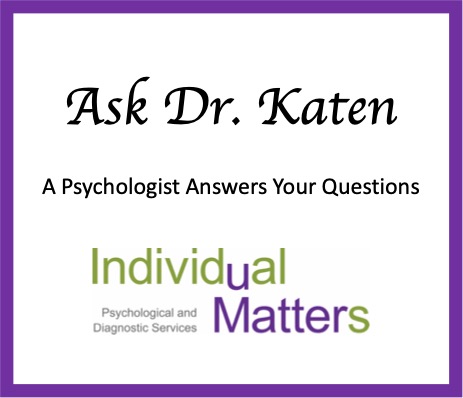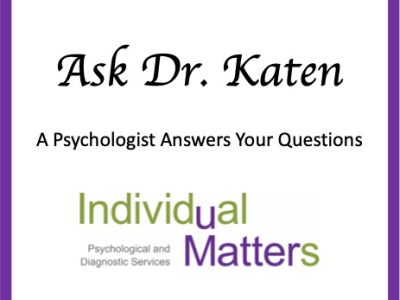In the September 2023 edition of the Individual Matters newsletter, we included a new element called “Ask Dr. Katen.” By way of a survey, we solicited readers’ questions about child development, learning, and behavior. Below are Dr. Katen’s responses to some of these questions.

Will the school tell me if my child is struggling in school?
My third-grade student seems to be struggling with reading. He has always had some difficulty in this subject, but recently he really seems to be falling behind. His grades are not bad, but they are not good, either. I think he’s a smart boy who shouldn’t be having this much frustration, but his teachers haven’t said anything to me. My question is: will the school tell me if there is a learning problem or recommend testing?
In my experience, it is very rare for schools to recommend an evaluation outside what the school offers. I have been told that the reason for this has to do with legal liability, but I can’t say for sure. While policies likely vary across districts and states, we typically hear from our clients that schools take one of the following approaches: 1) say nothing at all to parents (“Johnny is doing fine.”), 2) suggest the “wait and see” approach (“Johnny may grow out of it.”), or 3) suggest a conversation with the child’s pediatrician.
The downside of approaches 1 and 2 is that early assessment is crucial for identifying deficits and intervening effectively; to address neurodevelopmental problems like dyslexia, speech-language delays, fine motor problems, etc., earlier is better. The longer a parent waits to get a child assessed, the worse the problems may become and the more difficult they are to “fix.”
The problem with option 3 is that many pediatricians are seemingly unaware that the school will not refer parents to anyone but pediatricians. Understandably, pediatricians may then assume that the best resource for parents is the school. What results is a sort of “loop” – parents go to the school, then to the pediatrician, then back to the school again. The child’s problems continue to grow, parents are increasingly confused and frustrated, and there is no progress.
Ultimately, it is up to parents to get the help their child needs. If you sense that your child is struggling, find a psychologist who specializes in learning and development. Even if results are “normal” (do not result in a diagnosis) you will likely gain invaluable insights into your child’s functioning and personality that help explain many of their so-called “problems.” Knowledge is power, and this new understanding and awareness will empower you, as the parent, to make more informed decisions about what your child needs to find happiness and success.
If my child is diagnosed with ADHD, will he need to be on medication?
I’m pretty sure my child has ADHD. He has a hard time paying attention and he is constantly losing or forgetting to do things. These problems are affecting his schoolwork and resulting in some behavioral concerns. I’m told that an ADHD diagnosis might get him some extra help or accommodations at school. However, I don’t know if I want him to be medicated. Does an ADHD diagnosis automatically mean medication?
First, as a psychologist, I do not prescribe medication, nor do I make recommendations for its use; this is something to discuss with your child’s primary care provider.
However, my short answer is “no”: a diagnosis of ADHD does not mean that your child must be medicated. In fact, many parents choose to forego medication for their children with ADHD. They have found skills training and environmental modifications can be very effective for helping their kids mitigate the effects of ADHD. Designing routines and rhythms for daily activities can introduce needed structure and help children develop strategies they can carry into adolescence and adulthood. Counseling and occupational therapy can also be very effective at kids manage and work through their ADHD.
Also, it must be remembered that ADHD is a neurodevelopmental disorder for which there is no cure (the effects of medication are only temporary) Therefore, one of the most valuable long-term “treatments” for ADHD is to really understand what ADHD is and how it affects the individual. This process opens the door to acceptance. Through awareness of how inattention, inconsistency, disorganization, restlessness, etc. impacts a person’s life, that person can get better (and faster) at recognizing and acknowledging the symptoms, and proactively implementing healthy work arounds. Without a correct diagnosis, a person may assign the incorrect cause to their problems. When parents ask me, “Why does a diagnosis matter?”, my response is usually: “Because consciously or not, a child is going to identify a reason for her struggles; would you rather she has the correct label (ADHD) – or assume she was born a problem child with inherent flaws in her ability, character, or personality?”
Most importantly, ADHD manifests differently in every individual. I always tell parents that the struggles and strengths are unique to the child. For this reason, interventions and “treatments” must also be individualized to the needs of the child. There is no “magic pill.”
What can I do if my child has executive functioning deficits?
A speech-language therapist diagnosed my daughter with executive functioning disorder. I have heard this term on your podcast and done some research about what it means. There seems to be a lot of overlap with ADHD. Other than medication, what can I do to help her?
Executive functioning is a complex of skills and related deficits. Intervention strategies depend on your child’s unique EF profile. However, generally, a helpful approach is “reduce, reduce, reduce.” Reduce visual clutter, auditory clutter, desk clutter, bag and locker clutter. Reduce instructions, task complexity, project scope. Reduce the schedule, amount of things going on, homework, etc. Children with executive dysfunction often feel overwhelmed, don’t know where to begin, and may have difficulty finishing. Reducing addresses all these various areas of dysfunction. For more, check out our podcast series on EF: “The 5R Solutions for Everyday Living: A Series on Executive Functioning” (episode 3 is “Reduce”): https://individualmatters.org/the-5-r-solutions-for-everyday-living/
Thanks for your questions! Have a wonderful October.
-Dr. Katen
If you have a question for Dr. Katen related to child development, learning, or behavior, feel free to submit it via the survey in our newsletter. You can sign up for the newsletter here: https://individualmatters.org/newsletter-sign-up/
©2023 Individual Matters. All rights reserved. Feel free to republish so long as credit is given.
Individual Matters® is a registered trademark of Individual Matters, LLC.


 The Importance of Sleep
The Importance of Sleep